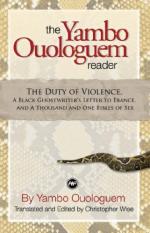|
This section contains 11,632 words (approx. 39 pages at 300 words per page) |

|
SOURCE: “Colonialism, Polyvocality, and Islam in L'aventure ambiguë and Le Devoir de violence,” in MLN, Vol. 107, No. 5, December, 1992, pp. 1000-27.
In the following essay, Wehrs analyzes the many voices of postcolonial Africa contained in Cheikh Hamidou Kane's L'aventure ambiguë and Ouologuem's Le Devoir de violence.
Much African fiction, such as Chinua Achebe's Things Fall Apart (1958), presents Western colonialism as the means by which an hegemonic, monological culture of imperialism displaces traditional cultures characterized by religions and rituals that recognize through polytheism a plurality of truths, or forces, or perspectives, and that recognize through democratic or deliberative political institutions a plurality of voices and interests.1 In this way, anti-colonial fiction may suggest a deep conceptual and moral affinity between the polyvocality affirmed by many African societies and the polyvocality that Mikhail Bakhtin sees as constitutive of dialogic, novelistic discourse.2 By contrast, Cheikh Hamidou Kane's L'aventure ambiguë (1961) and Yambo Ouologuem's...
|
This section contains 11,632 words (approx. 39 pages at 300 words per page) |

|


